 MyDogBreeds
MyDogBreeds Schweizer Niederlaufhund is originated from Switzerland but German Longhaired Pointer is originated from Germany. Schweizer Niederlaufhund may grow 27 cm / 10 inches shorter than German Longhaired Pointer. Schweizer Niederlaufhund may weigh 17 kg / 37 pounds lesser than German Longhaired Pointer. Both Schweizer Niederlaufhund and German Longhaired Pointer has almost same life span. Both Schweizer Niederlaufhund and German Longhaired Pointer has almost same litter size. Schweizer Niederlaufhund requires Low maintenance. But German Longhaired Pointer requires Moderate maintenance
Schweizer Niederlaufhund is originated from Switzerland but German Longhaired Pointer is originated from Germany. Schweizer Niederlaufhund may grow 27 cm / 10 inches shorter than German Longhaired Pointer. Schweizer Niederlaufhund may weigh 17 kg / 37 pounds lesser than German Longhaired Pointer. Both Schweizer Niederlaufhund and German Longhaired Pointer has almost same life span. Both Schweizer Niederlaufhund and German Longhaired Pointer has almost same litter size. Schweizer Niederlaufhund requires Low maintenance. But German Longhaired Pointer requires Moderate maintenance
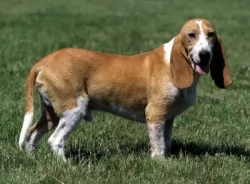 Originating in Switzerland, the Schweizer Niederlaufhund was established around 1900, when hunting became restricted to districts. The Swiss hunter needed a slower dog for the limited territory they could hunt in. Crossing selected Schweizer Laufhunds with Basset Hounds and other selected smaller, short legged hounds developed the Schweizer Niederlaufhund. By 1905 there was already a Schweizer Niederlaufhund Club.
Originating in Switzerland, the Schweizer Niederlaufhund was established around 1900, when hunting became restricted to districts. The Swiss hunter needed a slower dog for the limited territory they could hunt in. Crossing selected Schweizer Laufhunds with Basset Hounds and other selected smaller, short legged hounds developed the Schweizer Niederlaufhund. By 1905 there was already a Schweizer Niederlaufhund Club.
The Niederlaufhund became one of the best hunting dogs in the world, with its powerful body and ability to outhunt the Laufhund in tracking big game. Slower of course than the Laufhund it has a great sense of smell and an ability to easily find wounded animals. There are a few varieties, just like with the Swiss Hound again mostly because of their coloring. The Luzerner Niederlaufhund, the Jura Neiderlaufhund, and the Schwyzerlaufhund. They have musical voices that they use to communicate with the hunters and each other as well as that amazing sense of smell. They can hunt for hours without tiring and without much information from the hunter.
They are a cross breed not recognized by the larger kennel club such as the AKC and the UKC. They are recognized by the Dog Registry of America, Inc. (DRA), the American Canine Association Inc. (ACA) and most importantly by the Federation Cynologique Internationale (FCI). This last one is important because it could lead to recognition as a new breed by the UKC and the AKC.
 Looking at the German Longhaired Pointer you may think that you’re looking at a type of Setter dog or even a large Spaniel. These pointing dogs, hailing from Germany, are gun dogs or working dogs, having always been used to track game.
Looking at the German Longhaired Pointer you may think that you’re looking at a type of Setter dog or even a large Spaniel. These pointing dogs, hailing from Germany, are gun dogs or working dogs, having always been used to track game.
They were developed at the end of the 19th century, as breeders were specifically looking for a dog that was faster than the wiry- and short hair German pointers. Crossing English Setters and Pointers gave breeders this German Longhaired Pointer and the dog was shown for the first time in Germany in 1879.
Known as the GLP or Deutsch-Langhaar, the dog has the bloodlines of water dogs and scenthounds, and way back In 1897, Baron von Schorlemer wrote the first standard for the German Longhaired.
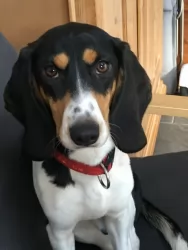 The Schweizer Niederlaufhund is a medium size, short dog. They look like their cousins, the Schweizer Laufhund but smaller. Their body is just slightly longer than it is tall, so you are left with the impression of a mostly square dog. The Niederlaufhund is well put together, with strong legs, a noble head, long droopy ears, broad chest, and a low held tail.
The Schweizer Niederlaufhund is a medium size, short dog. They look like their cousins, the Schweizer Laufhund but smaller. Their body is just slightly longer than it is tall, so you are left with the impression of a mostly square dog. The Niederlaufhund is well put together, with strong legs, a noble head, long droopy ears, broad chest, and a low held tail.
The Small Lucerne Hound has a white cote with smooth speckles of black or gray making them appear to be blue.
The Small Bernese Hound has a tricolor coat of white, tan and black. There are tan marks on the eyebrows. There is a wire haired Small Bernese as well. He has a short beard.
The Small Schwyz Hound is smooth coated in white with orange or yellow-red patches. The wired haired version is extinct.
The Small Jura Hound is a single coated dog with a black coat and tan marking above his eyes as eyebrows as well. He might have some white as well.
 Athletic and lean, the German Longhaired Pointer is a medium to large sized dog standing at 60 – 70 cm in height and weighing 25 to 32kg.
Athletic and lean, the German Longhaired Pointer is a medium to large sized dog standing at 60 – 70 cm in height and weighing 25 to 32kg.
With his webbed feet, he can move with great speed. It is why the dog isn’t suited well to life in the city really, as he has always been a dog used to working and running over large areas. He will appreciate being with an active owner.
The beautiful double coat is medium length, slightly wavy and with feathering around the legs, chest and tail. The tail itself is carried stretched outwards or kept low. It is rich brown to coppery color, while some white can sometimes be found on the chest and paws. The attractive dog has brown eyes, a black nose and ears which are long and floppy.
Intelligent, gentle and amicable the German Longhaired Pointer is an affectionate, loyal dog who is also social, getting on well with other pets in the home as well as with children.
Being the loyal dog that he is, it makes him susceptible to separation anxiety so he should never be put into the backyard and left day after day on his own.
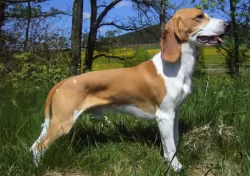 Children friendliness – yes, they are but use caution around small children and small prey.
Children friendliness – yes, they are but use caution around small children and small prey.
3. Adaptability - needs room to run and explore – is very frustrated when confined.
 German Longhaired Pointers are calm, friendly dogs who want to please their owners. They’re really intelligent too so training and socialization won’t be difficult with this bright dog.
German Longhaired Pointers are calm, friendly dogs who want to please their owners. They’re really intelligent too so training and socialization won’t be difficult with this bright dog.
Once trained, he makes an excellent, loyal and loving family pet. With a firm, kind, consistent type of owner, the German Longhaired Pointer is guaranteed to make you a wonderful pet.
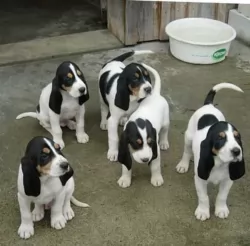 The Niederlaufhund Is prone to a very medical issues to keep an eye on. They include:
The Niederlaufhund Is prone to a very medical issues to keep an eye on. They include:
• Hip Dysplasia – This comes from hip joints that are not well formed and cause reduced mobility and pain. Parents can be tested before the dogs are bred to make sure their hips are good, and that dysplasia will not be passed to puppies. This dysplasia can cause arthritis and even lameness.
• Ear Infections – With long drooping ears it is easy for the dog to acquire ear infections. This is even more so for a hunting dog like the Niederlafhund. It is important to clean the dog’s ears on a regular basis.
 You’ll find that with an excellent diet and lots of love and care your German Longhaired Pointer can easily push 12 to 14 years of age.
You’ll find that with an excellent diet and lots of love and care your German Longhaired Pointer can easily push 12 to 14 years of age.
If you’re a novice dog owner, talking with your vet will give you a good idea of how to feed your dog to ensure longevity.
No matter how vibrant and energetic your pet is, there may well come a day when he is lethargic, he just wants to lie, he doesn't want to eat and he doesn’t jump up to greet you. Then it’s time for concern and to get your 4-legged friend to the vet.
There are several health problems associated with dogs that are worth researching – hip dysplasia, skin allergies, progressive retinal atrophy, allergies and cataracts.
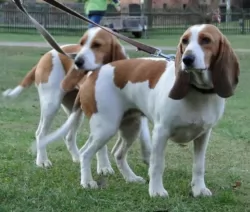 1Feeding the puppy - give 1 cup per day of high quality dog food divided into 3 meals.
1Feeding the puppy - give 1 cup per day of high quality dog food divided into 3 meals.
2.Feeding the adult – give one and one half cups of high quality dog food divided into 2 meals.
4. Games and Exercises – needs a lot of daily exercise and loves field trials, running and activities like barn hunt.
 German Longhaired Pointers have the same kind of nutritional needs as all other active working or sporting dog breeds. He needs high quality food, and if you feed him a commercially manufactured food, make sure its the best and that it has minerals and vitamins for active, large breeds. Most of the dog food companies have breed-specific formulas for size, age and activity levels of dogs.
German Longhaired Pointers have the same kind of nutritional needs as all other active working or sporting dog breeds. He needs high quality food, and if you feed him a commercially manufactured food, make sure its the best and that it has minerals and vitamins for active, large breeds. Most of the dog food companies have breed-specific formulas for size, age and activity levels of dogs.
Always ensure an ongoing supply of cool, fresh water is available to him.
The coat of the German Longhair can become matted and he will require brushing at least twice a week to keep the hair free of loose hairs as well as burrs that could lead to the coat becoming untidy and tangled. The ears will also have to be watched as thick matting can occur. Also check the inside of his ears to avoid dirt and wax build up which can lead to ear infections.
General grooming will also be reqired such as checking the length of the nails if they aren’t naturally worn down. Don’t neglect his teeth and brush 2 or 3x a week with canine toothpaste and toothbrush.
Your German Longhaired isn’t a dog who likes to spend his days lying round. He is energetic and loves to be on the go. From robust ball games to rope games, running with you as you go running, swimming or cycling, this dog can’t seem to get enough exercise and will want to be included in all your activities.